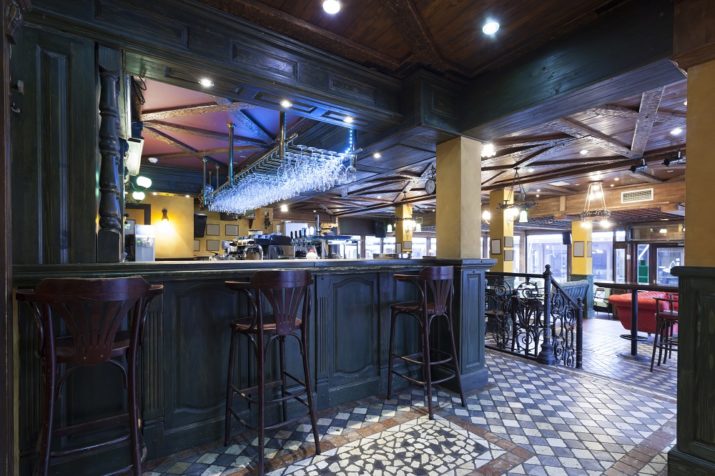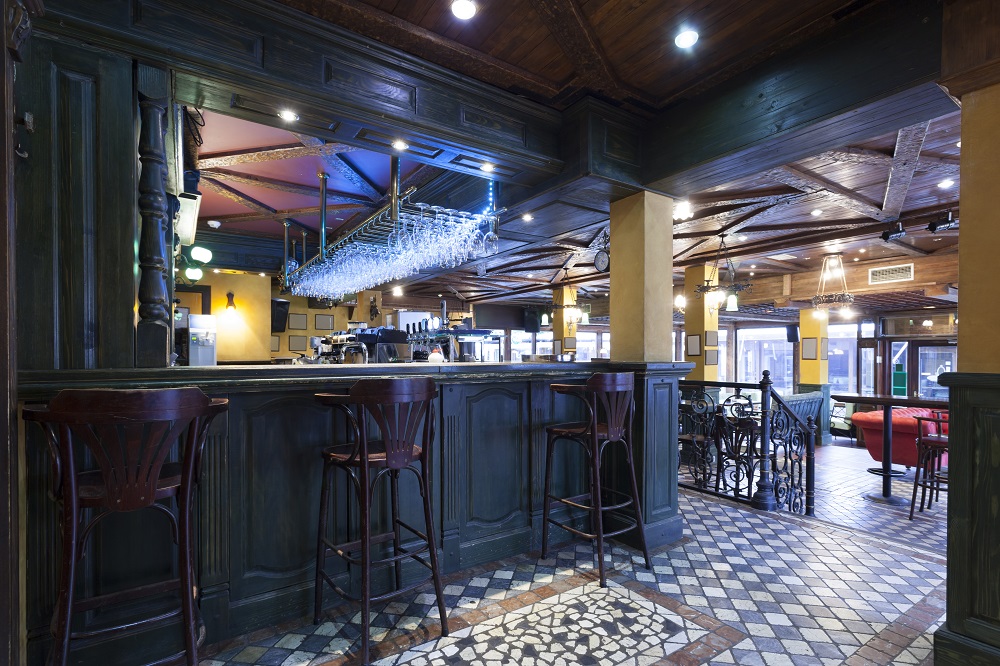
Part-time Work, Full-time Commitment: Casualization of Employment in the Irish Hospitality Sector

This is part of our special feature on Tourism: People, Places & Mobilities.
Hospitality sectors across Europe increasingly rely on a contingent workforce. Employment in bars, hotels, and restaurants is often casual and can be characterized by low pay (Baum 2007; Klein Hasselik et al 2003). Companies in this sector often move away from traditional regular employment and towards a model which Atkinson (1984) describes as ‘“core and periphery.” Workers at the core of the firm have secure contracts and are directly employed with the firm. Those located on the periphery, on the other hand, have very little security and are frequently outsourced on casual basis. Such strategies can also be described as “distancing flexibility” (Lai et al 2008).
This results in various types of atypical employment in different sectors, including agency work and increased involvement of sub-contractors, temporary contracts or causal work. Expanding service industries, including hospitality, tend to shift towards part-time work, often with irregular hours. (Kalleberg 2000). As a result, employment in this sector is often not attractive to those seeking regular work, and the staff turnover tends to be high. In order to cope with staff shortages, employers across many highly developed countries frequently engage transient workers such as students or migrants (Ruhs and Anderson 2010). We argue, however, that during the times of economic downturn, individuals who otherwise would seek full-time jobs, are instead forced into such flexible working arrangements.
Irish Hospitality Sector: An Overview
The hospitality sector is vital to the Irish economy. It supports around 140,000 jobs in accommodation and food alone, and it has been estimated that there are around 205,000 people employed in the tourism industry overall – about 10 percent of all the jobs in the country. The sector itself was significantly affected by the recession which followed the 2008 financial crash, but the number of jobs did not fall dramatically. However, while the overall employment remained relatively stable, the proportion of full-time jobs in accommodation and food decreased. Part-time employment, on the other hand, has grown. By 2015, more than 40 percent of hospitality workers were employed part-time, which was significantly higher than a national average of 23 percent. The number of weekly hours is also relatively low. It oscillates around thirty-two hours per week on average, compared to around thirty-six hours in overall employment.[1]
Hours in the hospitality sector are not only low, but also irregular and can vary from one week to another. This follows trends that can be observed in other European countries, most notably the UK, where employers moved towards so-called “zero-hours” contracts (Brinkley, 2013). Workers are essentially “on call” and have no guaranteed weekly hours. They also cannot refuse any hour that is offered to them, and have no security in relation to their weekly wages (Adams et al., 2016; Brinkley 2013). The Irish hospitality industry relies on a variation of this model and flexible employment is based either on “if and when” or “hybrid” contracts (O’Sullivan et al 2015). The “if and when” contracts do not guarantee any minimum weekly hours but (in theory) an employee is also not obliged to take on any work. Hybrid contracts specify the minimum hours the employee will work and allow the employee more hours if there is a demand. Again, contrary to the “zero-hours” workers, “hybrid” employees can refuse any additional hours offered by the employer. Our fieldwork, however, suggests that the situation is more complicated. Casual employees are not contractually bounded to accept their hours but are often forced to do so. This results in a situation where individuals cannot plan ahead or take on additional work. Furthermore, the allocation of working hours is used as a tool by managers to control workers.
Casualization of the Irish hospitality sector
Historically, the hospitality sector in Ireland offered some relatively stable jobs with good incomes and clear career paths. According to our participants and significant informants, work was more regular, providing employees with a predictable income. Similarly to other European countries, however, this sector became casualized over the last two decades. There was a clear consensus amongst our interviewees that such casualization emerged before the 2008 economic crash. While some views suggest that the shift occurred after a large influx of New Member States migrants in the mid-2000s, it became evident in our fieldwork that the shift started about a decade earlier. Some of our participants who had experience in this sector were able to trace it back to the 1994 FIFA World Cup, when bartenders in Dublin threatened to hold a strike over pay increases. Since then, bar owners moved away from hiring experienced workers on full-time basis. Instead, they started to take on young workers (often students) who were looking for temporary, more flexible jobs. The same trend then spread over restaurants and hotels. After the 2004 EU Enlargement, students were joined by the new arrivals from the Central and Eastern European Countries, who often treated this work instrumentally, or as a stepping stone.
What should be emphasized, however, is that during the boom such flexibility not only suited the employers, but was suited many workers. With a high demand for work, employees also had more bargaining power, which allowed them to negotiate their shifts and hours (Wickham et al 2009). This changed during the recession. As unemployment levels became high, workers lost their ability to negotiate. As a result, flexibility became a requirement not an option.
“Flexibility” has in fact recently become one of the buzzwords characterizing employment in the Irish hospitality sector. Workers are expected to be flexible, as rosters in many establishments are prepared on a last-minute basis. While workers are allowed to express their preferences, our interviewees reported that, in most places, shifts are determined on an arbitrary basis. Working hours and days varied for many of our participants, who in turn could plan neither their weekly activities nor their finances.
In general, the longer the worker was with the company, the more regular were their hours. This pattern, which can be characterized as “working towards better hours” often occurs in other demand-led employment sectors, for example, retail (Tormey 1999). One of our interviewees, who worked in a fast food restaurant, considered herself lucky as she could have the same shifts every week. Despite having an “if and when” contract, she worked for an equivalent of a full-time week. As she described her situation:
I was doing very well (…). I think it was like that because I was there for so long. Cause generally, the longer you were there, the more hours you would get out of it. And I was doing pretty much full-time hours. (…) I had very good hours and they were always fairly regular. I knew that I was going to work on Friday and I was always going to work on Saturday. (PAR03)
Others did not have this advantage. Another participant, who worked as an accommodation assistant in a large Dublin hotel, reported difficulties in making any plans. She had a hybrid contract with guaranteed eight hours per week, but usually worked between twenty and forty, depending on the number of guests. The unpredictability of her shifts started to be even more problematic as plans were made at ever shorter notice. This is how she described it:
They [the managers] write on the roster, they write for example: start at 8 am and finish at 3pm. But the next day you come and you see that you have work until 5pm, not until 3pm (…). You never know, you can’t plan anything. And now it is even worse because they put the roster on the wall the last day, on Sunday (…) So for example, if you have your day off on Monday, you can’t make a plan for your day because you didn’t know [that] you will have tomorrow off. (PAR31)
In some places, workers were not only given short notice about their shifts, but were also expected to be on call while not being paid for their waiting time. According to their contracts, they could refuse to take on these hours, but in practice they were not allowed to. If they did not accept shifts to which they were assigned then their rooster for the following week would include fewer hours. This resulted in a specific paradox: employees wanted more hours but also wanted more regular hours. Regularity, however, could only be achieved by conforming to this irregularity for a prolonged period of time. The allocation of shifts thus became a form of control: obedience was rewarded by better hours, while non-compliance was punished by less hours or inconvenient shifts.
Conclusion
Casual employment in the Irish hospitality sector is not a new phenomenon. Flexible working arrangements can also be of benefit to both employer and the employee. What clearly emerged from our fieldwork, however, is the changing nature of such flexibility. During the boom. work in the hospitality sector attracted many migrants and young people (especially students) who either did not seek regular employment, or who perceived it as a temporary solution. Working time was then negotiated between workers and managers. Employees often had the advantage that they could choose shifts that suited them. The flexibility sometimes simply fitted with their lifestyle.
This clearly changed during the recession. Many companies in the hospitality sector struggled, as their domestic customers had less disposable income, while international tourism was also affected by the global financial crisis. As a result, the number of those employed in Irish bars, hotels, and restaurants decreased after 2008; the sharpest fall was however related to full-time work. Part-time jobs in this sector were not, in fact, as severely affected. Employment in this sector has been increasing since 2011 and now exceeds the levels from before the crash. However, by 2016, part-time work was at higher levels when compared to the boom. This can be partially explained by government policy which reduced employers’ PRSI (Pay-Related Social Insurance) for low-paid employees between 2011 and 2013. That in turn incentivised managers to split jobs between part-time workers (O’Sullivan et al. 2015). It can be further argued, however, that since this is a demand-led industry, financially struggling employers prefer to have part-time workers available at any time, rather than full-time employees who are paid regardless of demand. Moreover, despite the recovery of the sector, such imposed flexibility became normalized.
This sector can also be characterized by relatively high levels of underemployment (EGFSN, 2015). Work in the Irish hospitality is usually paid by the hour, and hourly rates in this industry are amongst the lowest in overall employment. Workers therefore need more hours, as this maximizes their income. If they don’t get enough shifts, their wages are often lower than can be expected from a full-time minimum wage job. They are therefore forced to be flexible: if they do not accept hours that do not suit them, these will be assigned to somebody else. Furthermore, such refusal may result in fewer hours in the following week. As a result, workers on “if and when” contracts in the Irish hospitality sector have part-time contracts and part-time pay, but they are expected to be fully committed to their employment. This has significant consequences for many workers across the country: not only do they have difficulties with planning their private lives, but are also prevented from supplementing their wages with another casual job.
Professor James Wickham is a Fellow Emeritus of Trinity College Dublin where he was Jean Monnet Professor of European Labour Market Studies. He has led research projects on employment, migration and mobility. His most recent book is Unequal Europe: Social divisions and social cohesion in an old continent (Routledge, 2016).
Alicja Bobek works as a Researcher at TASC: Think-tank for Action on Social Change. She has a PhD in Sociology from Trinity College Dublin. She previously worked as a teaching and research fellow in the Department of Sociology, Trinity College where she was involved in projects related to migration, workplace and social integration.
Photo: Eviled, Shutterstock
References:
[1] Source: Quarterly National Household Survey, Central Statistics Office (own calculations).
Adams, A., Freeland, M. and Prassl, J. (2015). The ‘Zero-Hours Contract’: Regulating Casual Work, or Legitimating Precarity? University of Oxford Legal Research Paper Series, February 2015.
Atkinson, J. (1984). Manpower strategies for flexible organizations. Personnel Management, August, 28-31.
Baum, T. (2007). Human Resources in tourism: still waiting for change. Tourism Management, 28(6), 1383-1399.
Brinkley, I. (2013). Flexibility or Insecurity? Exploring the rise in zero hours contracts. The Work Foundation.
EGFSN. 2015. Assessment of Future Skills Requirements in the Hospitality Sector in Ireland, 2015-2020. Expert Group of Future Skills Needs, Dublin.
Kalleberg, A.L. (2000). Nonstandard employment relations: part-time, temporary and contract work. Annual Review of Sociology, 26, 341-365.
Klein Hasselink, J et al. (2003). EU Hotel and Restaurant Sector: Work and Employment Conditions. Dublin: European Foundation.
Lai, P.C., Soltani, E. and Baum, T. (2008). Distancing flexibility in the hotel industry: the role of employment agencies as labour suppliers. The International Journal of Human Resource Management, 19(1), 132-152.
O’Sullivan, M. (2015). A Study on Prevalence of Zero-Hours Contracts among Irish Employers and their Impact on Employees, University of Limerick.
Ruhs, M and Anderson, B. (eds.) (2010). Who Needs Migrant Workers? Labour Shortages, Immigration and Public Policy. Oxford University Press.
Tormey, R. (1999). Cutting at the wrong edge: Gender, part-time work and the Irish retail sector. Irish Journal of Sociology, 9, 77-96.
Wickham, J., Moriarty, E., Bobek, A. and Salamonska, J. (2009). Working in the Gold Rush: Polish migrants’ careers and the Irish hospitality sector. In: S. Bolton and M. Houlihan (eds.), Work Matters: Critical Reflections on Contemporary Work. Palgrave Macmillan, 81-96.
Published on September 6, 2017.




